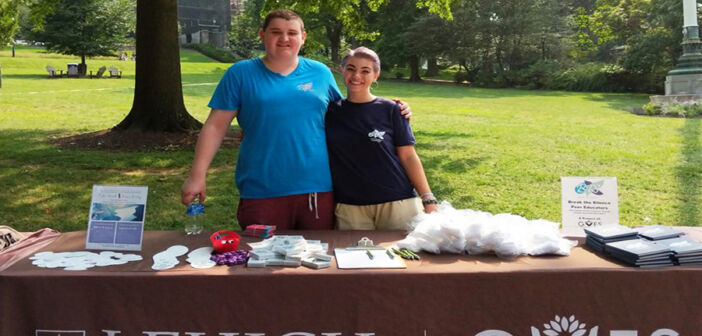As Violet Kertis, ‘22, neared the end of orientation during her freshman year in August 2018, she took a seat for yet another meeting regarding how to have the safest and most enjoyable college experience.
But what she expected to be a quick refresher on safe sex education turned out to be an informative and eye-opening facilitation on gender-based violence by Break the Silence, an on-campus peer education group run through the Gender Violence Education and Support Office, who facilitate conversations and events surrounding gender based violence through the promotion of healthy sexuality.
When the group finished their presentation, Kertis realized that due to her high school’s abstinence-focused sex education program, there were aspects of gender-based violence she was never previously taught—which she found to be a problem coming into college.
Moved by the group’s passion for their work, she grabbed a pencil and scribbled her name on the sign-up sheet in front of them.
The Gender Violence Education and Support Office (GVES) educates students on gender-based violence, prevention and healthy sexuality. They offer students support and educational services, training, workshops, campus-wide events and online programming.
Brooke DeSipio, sexologist and director of the office, said gender-based violence includes actions such as sexual assault, rape, intimate partner abuse, dating domestic violence, stalking, sexual harassment and sexual exploitation.
Research shows if people are better educated in sexuality and sexual orientation, they are less likely to perpetuate sexual assault, she said.
Gender violence education and support offices at other schools around the country are usually housed within other offices such as the health center, DeSipio said. At Lehigh, however, she said the university has a stand alone office dedicated to believing and supporting student survivors.
“We’re not Title IX that investigates, we’re not (The Office of Student Conduct and Community Expectations) that sanctions, we’re literally the only office that is a belief and support space for survivors which is really unique,” DeSipio said. “I think we’re the only office that also does truly comprehensive pleasure-based sex education as a form of prevention and that’s the goal of the office—helping to prevent gender-based violence through a strength-based healthy relationship approach.”
For students impacted by gender-based violence in any way, whether they are survivors themselves or have family or friends impacted by gender-based violence, DeSipio said the GVES can provide support services to anyone who requests them.
Students can talk through their situations and the office will help connect them with confidential resources, both criminal and university reporting options, support services, counseling, medical attention and an office representative every step of the way.
“It’s nice because we can be the one person that they have throughout all of the different processes,” DeSipio said. “Our office can actually go with them to all of those meetings so they have the same one home base person to help coordinate everything which can feel really comforting and helpful to students who are going through this.”
Housed within the GVES office is also the Gender Violence Support Advocates program, a group of Lehigh staff members who are trained to support gender violence survivors. The office also houses Break The Silence.
Tom Golden, ‘18, ‘20G, a graduate assistant in the office who helps run, Break The Silence, said it is common for students to come up to him after presentations and say they never knew that an experience they previously had would be described as sexual assault.
“People would come up to us and say that our presentation was the reason that it finally hit them and I just think that’s amazing,” he said.
Another function of GVES is to educate students on gender-based violence, prevention and healthy sexuality, which it accomplishes through training, workshops, campus-wide events and online programming.
Though the COVID-19 pandemic has shifted the way GVES operates and connects with students, Golden said both he and DeSipio have tried to make themselves available to students as much as possible either online or in person during the pandemic.
Located in rooms 108 and 109 in the University Center, the GVES has remained open during the spring semester for students to come in and chat with Golden or DeSipio. Online meetings can also be scheduled through its website, Golden said.
For DeSipio, the biggest challenge adjusting their programming during the pandemic was figuring out how to best support survivors in an isolated world.
“Survivors need support and community and that is one of the things getting lost in COVID is that if you can’t be around people, you can’t be in groups and you can’t have that support around you—I think that can be really impactful on survivors,” DiSipio said.
To account for this change, the GVES has tried to maintain in-person programming when possible through its trauma-informed yoga program “Take Back Your Body” which has remained open all semester except when the university was closed due to spikes in COVID-19 cases.
Additionally, the GVES offers programming regarding how gender-based violence is being affecting by the pandemic as well as safe sex tips.
Since their work is foundationally based on interactions with other humans, DeSipio said she is curious to see how social isolation caused by the pandemic will affect people’s intimate relationships when normalcy is returned and if the office will have to shift their programming for that.
For now, the GVES has continued to host events throughout the semester with both in-person and virtual options for students, with the bulk occurring during April: Sexual Assault Awareness Month.
During the second week of April, the GVES hosted an education week featuring a new program about reclaiming one’s sex life after sexual trauma.
They co-sponsored an event with the Crime Victims Council of the Lehigh Valley (CVCLV), the local rape crisis center and one of its various community partners. They also partnered with Lafayette College’s peer-education group Pards Againts Sexual Assault and held a community conversation on preventing gender violence, as well as a Lehigh-Lafayette fundraising competition to raise money for the CVCLV.
The office also hosted “Take Back the Write” on April 15, a trauma informed healing workshop using writing and art to help people process and heal from trauma. Golden said the event was considered to be a prelude to “Take Back the Night,” a national event on April 22 where students marched on campus and survivors have the opportunity to speak about their experiences and gain support.
During the last week of April, the GVES will be hosting its annual “Slut Walk” event, which is its awareness consciousness raising protest about victim blaming, slut shaming and rape myths, DeSipio said.
For Kertis, being involved in Break The Silence, especially during Sexual Assault Awareness month, has reiterated to her the vitality of having conversations about gender-based violence in the process of healing through that type of trauma on Lehigh’s campus.
“Knowing there’s a space for you to be on campus where there are people that you can talk to, confide in, learn from and have shared experiences is just completely an invaluable experience and it’s something I don’t take lightly,” Kertis said. “The experiences on Lehigh’s campus through administrative offices have not always been the best, so being able to have more of a student centered support group is really important.”
DeSipio said she is sometimes frustrated by the way the university handles matters of gender-based violence for students, which dates back to her days as an undergraduate and masters student at Lehigh.
DeSipio founded the GVES office in 2014 as an attempt to change the experiences she had on campus and make it a better place for students.
DeSipio wants students to know there is an office on campus that is committed to making sure their voice is at the table and that matters don’t get swept under the rug.
“Please know that there is a person at Lehigh that will not let that happen here, that I am with every fiber of my being committed to making sure that our survivors get the support and the respect and the healing that they need,” she said.






Comment policy
Comments posted to The Brown and White website are reviewed by a moderator before being approved. Incendiary speech or harassing language, including comments targeted at individuals, may be deemed unacceptable and not published. Spam and other soliciting will also be declined.
The Brown and White also reserves the right to not publish entirely anonymous comments.